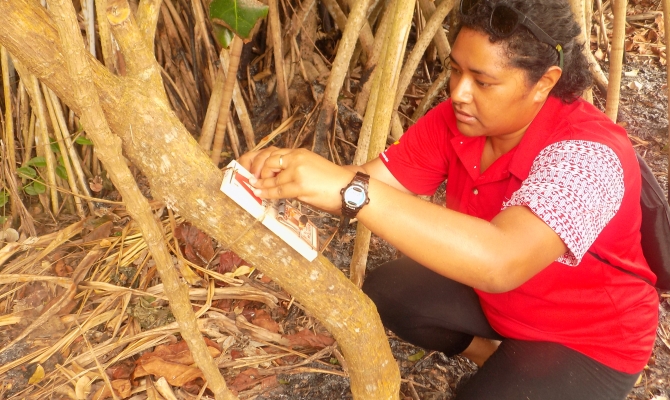
Rat eradication programmes have long been used to tackle the issue of invasive species. Yet there is still much to learn about measuring the response of ecosystems to the absence of invasive rats, particularly in the Pacific region.
Are there more birds? Are there more fish or coral diversity to indicate the adjacent coral reefs are healthier without rats on the islands? If so, how can we easily measure this?
Enter Ms Siosina Katoa, a 32-year-old Tongan woman undertaking a Ph.D. in Environmental Science at the University of Newcastle, Australia. Supported by the Secretariat of the Pacific Regional Environment Programme (SPREP) Pacific Regional Invasive Species Management Support Service (PRISMSS), with the laboratory work funded by the European Union under the Pacific Bioscapes Programme, her research is focused on rat eradication and measuring its impact on ecosystem recovery and resilience.
According to Ms Katoa, her thesis "Understanding the impacts of eradicating rats (as an invasive species) to support ecosystem recovery and resilience," unfolds like a narrative.
“Our island ecosystems depend on the flow of nutrients from land to sea and sea to land. For example, on islands, seabirds feed in the ocean and drop their faeces onto land when they return to roost, with the nutrients from these faeces going back into the ocean through water runoff,” she explains.
“Their droppings hold rich nutrients from what they eat from the ocean, and when it runs back into the coral reefs the nutrients benefit the health of corals and other marine species. This cycle keeps the ecosystem healthy. However, when invasive rats prey on birds, the chicks, and their eggs, it affects this flow of nutrients and will eventually cause ecosystem collapse, made worse by the omnivorous rats also eating seeds and shoots of the island vegetation.”
Ms Katoa has been collecting water samples for eDNA analysis, to compare the level of biodiversity between rat-infested islands and rat-free islands. The results of this research builds on lessons from other Pacific islands in invasive species management and will recommend methods of monitoring for communities to demonstrate successful biodiversity outcomes following rat removal.
Born and raised in Tonga, Ms Katoa comes from the village of Mu’a located on the eastern side of Nuku’alofa. Like all small villages in rural areas, she lived in an environment surrounded by bushland close to a shallow lagoon sheltered by mangroves and seagrass beds.
Growing up with a deep connection to her natural surroundings instilled in her a profound sense of stewardship, particularly crucial during a critical time of the increasing impact of climate change in the Pacific. This connection fuelled her passion for environmental protection and steered her towards her chosen career path.
“My surroundings drew me closer to nature and made me want to work with nature,” Ms Katoa reflects, “But above all these things, coming from an island vulnerable to the impacts of various environmental issues such as climate change and invasive species, was the strong urge that made me want to pursue a career in this field. It makes me think of my family, my nieces and nephews’ future, my people, and our biodiversity”
Ms Katoa landed her first job after completing a Bachelor of Arts in Geography at the University of the South Pacific. She took on the role of a project technical officer under the Global Environment Facility – Pacific Alliance Sustainability (GEF-PAS) Regional Invasive Alien Species project. The field of invasive species management is predominantly male-dominated, and she encountered scepticism regarding her suitability for the role. Yet, Ms Katoa refused to be deterred.
“Not a lot of women were interested in this area and the fact that you are working with rats, a devious rodent that everyone hates, makes it more unlikable,” she recalled. “It was discouraging when we were told it would be easier for men to do the job because working with invasive species would require intensive hours of trapping rats, removing weeds and invasive plants as well as traveling to remote areas.”
However, Ms Katoa's resolve remained unshaken. The initial discouragement melted away when she witnessed firsthand the devastating impacts of invasive species on ecosystems and community livelihoods.
“I entered the field of invasive species management for a variety of reasons. I loved everything about the environment, animals, birds, vegetation, the ocean, and the beautiful creations enhancing the surface of the earth and mother nature. However, I was generally driven by a concern for the environment and a desire to mitigate the negative impacts of invasive species on the ecosystems and human well-being.
She added, “As a project technical officer under the GEF-PAS Regional Invasive Alien Species project, I travelled places and witnessed first-hand the impacts of invasive species (birds eaten by rats, forests overtaken by invasive weed and trees etc). I engaged in talanoa with people at the grassroots level to see what we can do together, and then using information collected to help with decision-making.”
Ms Katoa is currently in her third year of study and credits her involvement working on the GEF-PAS Regional Invasive Alien Species project for not only equipping her with hands on field experience in preventing and managing invasive species but also with enhanced analytical and management skills,
“My experience as the GEF PAS Technical Project Officer, enabled me to improve my communication, analytical, and management skills. It taught me how to overcome difficulties working under pressure and with no supervision. Most importantly, I’ve personally learned that working together will always get the job done”.
“I’m grateful for the opportunity given by the University of Newcastle and SPREP through PRISMSS to do this study - never did I think I’d be able to do this. We shouldn’t be discouraged to do what we want because of gender roles portrayed by society, but rather do things because it will benefit everyone. Invasive species work is not gender-specific; anyone can do it if they have the passion.”